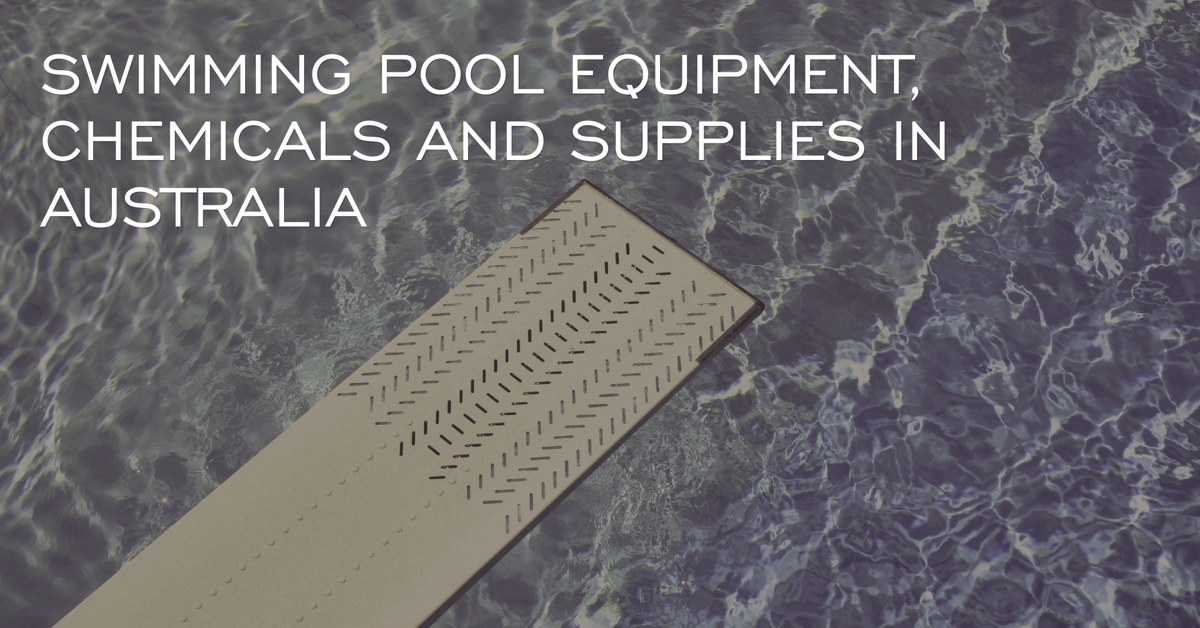Swimming Pool Equipment, Chemicals and Supplies in Australia
Swimming Pool Equipment Chemicals Supplies

A swimming pool can be made either above or below ground, and constructed from materials like concrete, metal, plastic or fiberglass.
Pools that are used by several people or by the general public are referred to as public pools, while pools used by a few people or in a residence are called private pools. Several health clubs, fitness centers, and private spas have public pools. Most first rate hotels have pools for their guests.
Swimming pools are also used for recreation, or for diving and other water sports, in addition to training of lifeguards and other professionals who need to swim.
How to Properly Maintain a Swimming Pool
Appropriate water chemistry is required to keep a swimming pool safe and hygienic for swimmers, and maintaining a swimming pool's chemicals can save pool owners precious time and finances. By following these easy steps, any pool owner can preserve their own swimming pool with the same outcome as higher-priced professionals.
First, determine what type of swimming pool supplies to use. Chlorine, that kills bacteria, algae, and microorganisms can be bought in bottles, 3-inch tablets, 1-inch tablets, sticks, as well as a granular form; but, when reading the labels, you will see that the active ingredients are the same in all of them.
Despite the disparity in cost, the only real difference you may find is the potency of the active ingredients. The active ingredient in 1-inch tablets, 3-inch tablets, and sticks is referred to as "Trichlor" (or Trichloro-S-Triazinetrione), and the active ingredient in granular chlorine is called "Dichlor" (or Sodium Dichloro-S-Triazinetrione). So it pays to know your swimming pool supplies.
The most common swimming pool supplies are in the form of chlorine 3-inch tablets. These are slow-dissolving and need less maintenance. Chlorine sticks are swimming pool supplies that are larger and break up slower than 3-inch tablets but are not as widely used. 1-inch chlorine tablets break up more swiftly than 3-inch tablets or chlorine sticks and are better for above-ground swimming pools or small in-ground swimming pools.
Inexpensive swimming pool supplies like "big box" slow tabs and sticks are likely to have binders and fillers that join the tablet together. The difference becomes apparent as they dissolve as cheap tabs and sticks tend to disintegrate within 2 to 3 days.
When it comes to swimming pool supplies, granular chlorine functions just like the tablets and sticks mentioned above but inorganic chlorine like calcium hypochlorite should be dissolved in a bucket of water before placing in a swimming pool.
When it comes to swimming pool supplies use cyanuric acid with caution. New studies indicate that CYA needs to be maintained at a level no higher than 40 ppm permitting chlorine to perform optimally.
Automatic chlorine feeders are convenient for constant upkeep of your swimming pool. Chemical feeders offer very exact control over the quantity of chlorine being added to the water.
With your swimming pool supplies, you should never just place chlorine tablets or sticks into your swimming pool. High concentrations of chlorine slowly eat at the inside of the circulation system and can cause untimely breakdown of your pool pump and filter components.
Maintain a proper pH level when it comes to your swimming pool supplies. This is just as vital as having chlorine in the water. The pH level in your pool should be similar to the pH level of human tears, with a range of 7.2 - 7.6.
The most effective way to lower pH is by slowly pouring "Muriatic Acid" directly into the deep part of the water while the pump is on. If it is in your swimming pool supplies, granular acid is a safer alternative than Muriatic Acid. Put in a little amount of Muriatic Acid and check the pool after about 6 hours of filtration, readjusting pH as needed. Take note that if swimmers are having a problem with "burning eyes,” high or low pH is probably to blame, not high chlorine.
Test the water at least two times per week to ensure the balance of swimming pool. Maintain your pool chlorine amount at 1-3 ppm always and you are certain of an easy and low-maintenance swimming season.
Maintaining your pool requires the right swimming pool supplies as well as some knowledge on how to manage the water. Go out of your way to have both, so you can enjoy a trouble-free swimming pool for everyone’s pleasure.